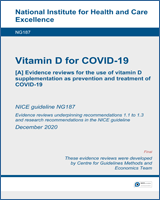From: Evidence reviews for the use of vitamin D supplementation as prevention and treatment of COVID-19

NCBI Bookshelf. A service of the National Library of Medicine, National Institutes of Health.
| Field | Content |
|---|---|
| PROSPERO registration number | Not registered |
| Review title | Vitamin D supplementation for preventing SARS CoV 2 infection (and subsequent COVID-19) |
| Review question | What is the clinical effectiveness and safety of vitamin D supplementation for the prevention of SARS CoV2 infection (and subsequent COVID-19) in adults, young people and children? |
| Objective | To investigate the clinical efficacy, effectiveness and safety of vitamin D supplementation to prevent SARS CoV2 infection (and subsequent COVID-19). |
| Searches |
The following databases will be searched:
The full search strategies for MEDLINE, Embase and CENTRAL database will be published in the final review. |
| Condition or domain being studied | COVID-19 |
| Population |
Inclusion:
Subgroups will be explored, see (section 17). Exclusion: Adults, young people and children who already have contracted SARS CoV2 at the point of study entry. |
| Intervention |
Vitamin D supplementation (all dosages, formulations and routes of administration). Note: Vitamin D supplementation as a combination preventative strategy with other preventative interventions will be included if other preventative interventions are balanced out in the control arm. |
| Comparator |
Placebo or no preventative intervention Note: for vitamin D supplementation as a combination preventative strategy with other preventative interventions, the comparator will be the index preventative intervention(s). For example: Vitamin D + Preventative treatment X versus Preventative treatment X. |
| Types of study to be included |
Inclusion:
Exclusion:
|
| Other exclusion criteria |
|
| Context | It has been hypothesised that vitamin D may have a role in the body’s immune response to respiratory viruses. The 2 major forms of vitamin D, vitamin D3 (colecalciferol) and vitamin D2 (ergocalciferol), are licensed for the prevention and treatment of vitamin D deficiency. Vitamin D supplements are not specifically licensed for preventing or treating any infection, including the novel coronavirus infection that causes COVID-19. |
| Primary outcomes (critical outcomes) |
|
| Secondary outcomes (important outcomes) |
|
| Data extraction (selection and coding) |
All references identified by the searches and from other sources will be uploaded into EPPI reviewer and de-duplicated. 10% of the abstracts will be reviewed by two reviewers, with any disagreements resolved by discussion or, if necessary, a third independent reviewer. The full text of potentially eligible studies will be retrieved and will be assessed in line with the criteria outlined above. A standardised form will be used to extract data (for example, baseline vitamin D status, dosage) from studies (see Developing NICE guidelines: the manual, Appendix L). |
| Risk of bias (quality) assessment |
Risk of bias will be assessed using the appropriate checklist as described in Developing NICE guidelines: the manual. For systematic review, ROBIS will be used For RCT and CCT, Cochrane RoB 2 tool will be used For prospective and retrospective cohort study, Cochrane ROBINS-I will be used. |
| Strategy for data synthesis | Where appropriate, pairwise meta-analysis will be conducted based on Cochrane Handbook for Systematic Reviews of Interventions (version 6.1, 2020)
|
| Analysis of sub-groups | Subgroup effects will be explored for:
|
| Type and method of review | Intervention |
| Language | English |
| Country | Review conducted by NICE, England |
| Anticipated or actual start date | 26/10/2020 |
| Anticipated completion date | 23/11/2020 |
| Named contact |
5a. Named contact Toni Tan Catrin Austin 5b. Organisational affiliation of the review National Institute for Health and Care Excellence (NICE) and Public Health England (PHE) |
| Review team members | From NICE:
|
| Funding sources/sponsor | This systematic review is being completed by NICE which receives funding from DH&SC, NHSE and PHE. |
| Conflicts of interest | All guideline committee members and anyone who has direct input into NICE guidelines (including the evidence review team and expert witnesses) must declare any potential conflicts of interest in line with NICE’s code of practice for declaring and dealing with conflicts of interest. Any relevant interests, or changes to interests, will also be declared publicly at the start of each guideline committee meeting. Before each meeting, any potential conflicts of interest will be considered by the guideline committee Chair and a senior member of the development team. Any decisions to exclude a person from all or part of a meeting will be documented. Any changes to a member’s declaration of interests will be recorded in the minutes of the meeting. Declarations of interests will be published with the final guideline. |
| Collaborators | Development of this systematic review will be overseen by an advisory committee who will use the review to inform the development of evidence-based recommendations in line with section 3 of appendix L of Developing NICE guidelines: the manual. Members of the guideline committee are available on the NICE website. |
| Other registration details | N/A |
| Reference/URL for published protocol | N/A |
| Dissemination plans | NICE may use a range of different methods to raise awareness of the guideline. These include standard approaches such as:
|
| Keywords | Vitamin D, COVID-19. |
| Details of existing review of same topic by same authors | N/A |
| Additional information | None |
| Details of final publication |
www |
From: Evidence reviews for the use of vitamin D supplementation as prevention and treatment of COVID-19

NCBI Bookshelf. A service of the National Library of Medicine, National Institutes of Health.